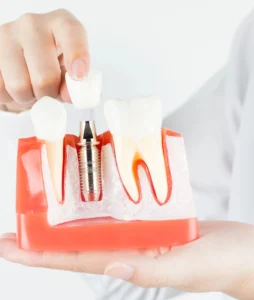Many people get confused between bruxism and temporomandibular joints disorder (TMD) as they have similar symptoms. However, it is important to differentiate between the two to be able to get them treated at the right time.
What is Bruxism?
Bruxism is a condition where people tend to grind their teeth by clenching their jaw. This occurs mostly at night and is a subconscious habit that is difficult for them to avoid.
Clenching your jaw regularly might lead to some permanent problems and damages to the teeth like:
- Cracked teeth: Rubbing your teeth with each other forcibly will result in cracking and fractures in your teeth.
- Sensitive teeth: When the teeth are grinding together, the enamel surfaces that rub against each other get scraped off, increasing the sensitivity.
- Fillings and other dental work getting damaged: When you clench your jaw regularly, your teeth become loose over time, letting go of the fillings and causing problems to your crowns or dentures.
- Jaw pain: The force of the teeth digging into the gums will cause constant jaw pain with sleepless nights where you consistently keep grinding your teeth to find some relief.
- Headaches: Any toothache tends to cause a headache as well, similarly jaw pain and nerve damages can cause severe headaches.
- Hearing loss: In worst-case scenarios, people tend to lose their hearing due to this habit.
Treatment
The most easy and common way to treat bruxism is with the help of a mouthguard given by the dentist. It can be worn while sleeping, which relaxes the face muscles and prevents the teeth from grinding forcibly.
What is TMJ Disease?
There are temporomandibular joints on both sides of your jaws, which help with the smooth movement of opening and closing of the jaw. Joint paint and difficulty in moving your jaw are the main symptoms that one might feel in this disorder. It occurs due to untreated bruxism, any kind of injuries or even arthritis.
It can also cause:
- Jaw swelling: The glands in the jaw can swell up and form lumps, which cause difficulty in moving.
- Difficulty in chewing: When the movement of your jaw becomes painful there is great difficulty in chewing solid foods and open your mouth fully.
- Jaw lock: When you are unable to open your mouth very far and it gets stuck at a certain position, this also occurs due to a joint disorder.
- Pain all around the jaw: You might also experience pain in your neck, shoulders and face while eating and talking.
Treatment
This also requires a mouthguard which, has a specialized design that is recommended by a certified dentist. It’s made of a strong acrylic material that helps chew and talk easily while repositioning your jaw.
You can contact us and if you experience any of these symptoms and get treatment by visiting our licensed dentists. We also offer other dental treatments like dental cleaning, teeth whitening and fillings. We can accommodate your dental emergencies and same-day appointments as well in West Hills.





